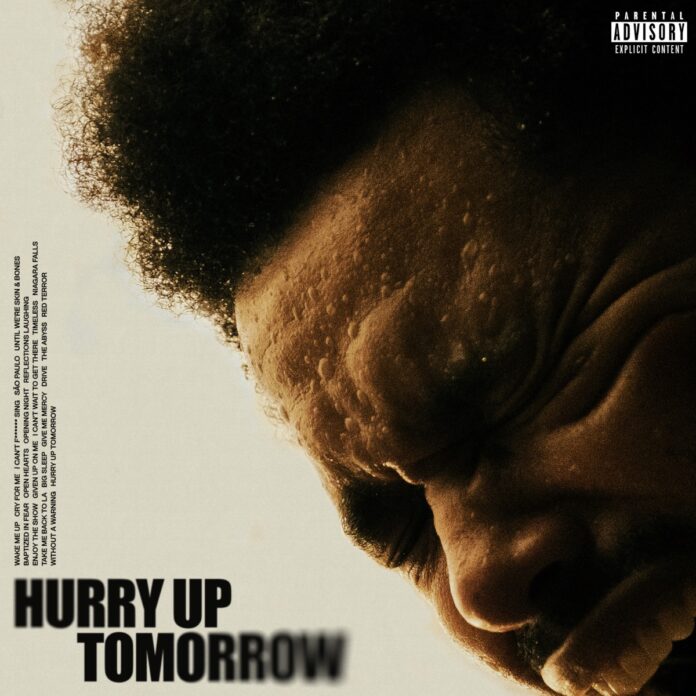
The Legend, The Icon, “The Idol,” and undeniably the biggest artist of the 21st century—The Weeknd—approached the end of his trilogy and his persona. The Weeknd’s latest album, Hurry Up Tomorrow, is the conclusion to the trilogy that Abel started back in 2020 with After Hours.
After a quite mixed reception of singles that Abel teased throughout the roll-out, the emotions and expectations surrounding the project were quite uncertain. Whether you heard a synth-pop, pop-rap inspired “Timeless” with Playboi Carti or “Sāo Paulo,” which finds itself in a subpar mix and a cheap imitation of Funk Madelāo, The Weeknd himself did not really participate in the roll-out either, barely promoting or supporting the theme of ‘Rebirth’ or ‘Death,’ which seemed to be the central topic of the record. All those factors combined, my expectations for the record were truly low, as The Weeknd was not really hitting the mark at some points during the roll-out.
However, with Hurry Up Tomorrow now here, were my expectations and worries valid?
Absolutely not.
Funnily enough, none of the singles serve as a clear indication of what the record sounds like. Hurry Up Tomorrow is where The Weeknd tries to combine elements from his career one by one and implement them into one solid foundation—whether it is the synth-wave production on “Wake Me Up,” combining the darkness and brightness of Abel’s previous records, or “Open Hearts,” which jumps fully into the dance-pop scene predominant on Dawn FM.
Some of the other performances on tracks like “Baptized In Fire” or “Cry For Me” remotely evoke what you might find on Kiss Land or Beauty Behind The Madness.
Is it to say that Abel’s new record doesn’t bring you anything new?
No, again.
The Weeknd’s latest record fills the sound with such colors that you might have never expected to hear or see, pushing vibrance and darkness right onto you. Abel easily builds up the suspense in various ways throughout.
On “Reflections Laughing,” the singer chases flashes of light with his harmonious vocals that transition into a luxurious guitar loop foreshadowing the darkness.
I am glad to see that Abel doesn’t solely pursue hard-hitting bangers like on “Timeless” but rather adds another layer of dynamic, gruesome yet empathetic sound. For example, “Given Up On Me” immerses you in a raw and brooding beat that abruptly transitions into gentle classic R&B with chic touches.
Furthermore, despite creating an immersive, curated elegance with sporadic bursts of raw energy, Abel delivers a dual sense of emotion throughout the record. Whether it is the mournful, cinematic part of “Wake Me Up” that later becomes ethereal, dreamy pop, or “Big Sleep,” which adds a nice touch of psychedelia and bizarreness to the record’s stability by bringing up the accumulated tension once again.
Throughout all these years, Abel has been one of the best at building tension and then striking with the most epic and exciting resolutions. This record is no exception.
Abel easily navigates through the diverse sounds he has developed throughout his career on this album, jumping from melancholy to crescendo-driven monumental sound.
Another thing to notice on this album is its direction and how well-collected and produced the record sounds. Despite my earlier criticism over sluggish single choices and uninspired music videos for these songs, the album gives you an absolutely unmatched idealism.
Every feature seems fitting, and while not excessive, they showcase the strong and experimental sides of everyone on it. For example, Travis delivers an insanely pitched deep voice on “Reflections Laughing” that was not showcased before—something absolutely contrary to the recent “4X4”—or the delicate yet striking touch of Lana Del Rey on “The Abyss.” I also feel that this is the record where Abel most embraces a fusion of hip-hop/trap influence with synth accompaniment, and if with “Timeless” I wasn’t a huge fan, something expansive like “Enjoy The Show” featuring Future works perfectly.
This record is also a good demonstration of where The Weeknd and Mike Dean really went at it; you can easily feel the dominance of distinctive synths. Lately, Dean’s mixing wasn’t on the highest echelon. However, here there is simply nothing to pick on regarding Dean’s mixing—except for sometimes louder instrumentals on “Cry For Me,” where Mike steps away from the “watered down” mix.
So, while Hurry Up Tomorrow is an undeniable masterpiece that immerses you in the unforgettable, cinematic warmth of music, it is still hard to crown it as the best of the new trilogy. The strong advantage the previous two records have for me over this new joint from Abel is simply the length. While After Hours clocks in at 56 minutes and Dawn FM at 52 minutes, Hurry Up Tomorrow exceeds 80 minutes. The new record certainly offers an extensive range, and considering it is Abel’s final The Weeknd album, that is actually advantageous. However, due to such an extensive track list, I had trouble remembering every song because the experience felt so smooth yet prolonged. The feeling of tension was omnipresent, but distinctiveness sometimes gets lost in such a wide range of songs.
So, the length is probably my only complaint, as it brings up issues with the album’s cohesiveness and its distinguishing sounds compared to previous records.
And, well, I still absolutely dislike São Paulo.
Score/Outstanding: To sum it all up, Hurry Up Tomorrow is a beautiful piece of art that confidently and cinematically closes out The Weeknd’s career. Its rhythmic waves, alongside the wavy aesthetic of the record, create a mind-blowing experience. It is gentle, expansive, rich, nostalgic, and experimental. It has all the attributes of The Weeknd’s perfect record, and, to no one’s surprise, Abel executed it perfectly.
[We rank singles, EPs, and albums on a scale of Poor, Mediocre, Good, Excellent, and Outstanding]










![Wong Diane – Now Only Me (Single Review) Wong Diane Now Only Me [Single Review]](https://musicreviewworld.com/wp-content/uploads/2023/08/Wong-Diane-Now-Only-Me-Single-Review-1-356x220.png)



